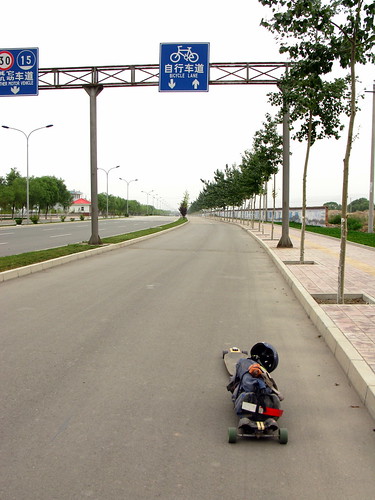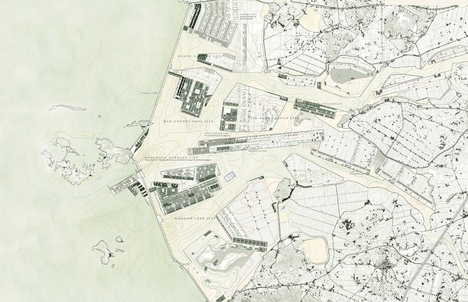-
• #52
it's Cook............ I'm bit more than a engineer now josh!!!
-
• #53
dont care that much as long as there is none of this

but more of this

-
• #54
manhattan island.
-
• #55
what about it?
-
• #56

This thread represents a massive can of worms for me. I refer you to an architectural competition i was involved in earlier this year, for the south korean government, that attempted to do exactly that- design a completely new city from scratch, the land reclaimed from the sea. it was 400km2. I asked on here about cycle commuting distances as my specialism within the team was infrastructure/public realm:
http://www.londonfgss.com/thread3715.html
We won the competition, joint-first with MIT. For those interested it was quite well covered by Building Design journal:
http://www.bdonline.co.uk/story.asp?sectioncode=426&storycode=3108110
http://www.bdonline.co.uk/story.asp?sectioncode=426&storycode=3122242
http://www.bdonline.co.uk/story.asp?sectioncode=428&storycode=3128496
Congratulations on the win- I was reading the original post with some interest but couldn't think of anything much to add. Much like now.
-
• #57

Red Star = Me
Everything else = My minionsJob done.
Hippy is the Pope?
-
• #58
Texas, if you really want to have a proper conversation about town planning, get it into your head that the automobile as a personal form of transport will always be with us, the only difference in the future will be the means of propulsion.
-
• #59
+1.
-
• #60
what about it?
my idea of the perfect city desgin, and no poor people, so no problems.
-
• #61
Hippy is the Pope?

-
• #62
Texas, if you really want to have a proper conversation about town planning, get it into your head that the automobile as a personal form of transport will always be with us, the only difference in the future will be the means of propulsion.
my point is that the 'automobile' is unacceptable in certain circumstances and not really needed if you look at the actual problem and what you are trying to achieve. my examples of new towns are where planners have tried to plan the city to suit the car. The result - FAIL.
you might as well add +100s to your statement as the car lobby is very powerful and represents the majority (eg. have you looked at the transport appraisal advice and noticed values of times recently?). therefore having 'a proper conversation about town planning' is indeed difficult as we are stuck with people saying 'the car is essential so plan you city for it'.
so to answer your question directly - no i'm not going to get it in my head that we're stuck with the car when thinking about an ideal city. but merry christmas to you indeed!
-
• #63

generic city innit ?? -
• #64
Okay, before I start off here, let me state that I am a huge fan of cycling, and a huge fan of cars, as some of you may know.
Now, for the vast majority of all of my journeys, i'll use my bike, it's more fun, it's better exercise, it's more fun. However, asking everyone to switch to cycling is going to be a bit of a problem, first of all, not everyone will like the idea of having to cycle most places, because it's slower, and it takes a lot of effort, especially when you start out. On the public transport issue, a lot of people (myself included) aren't a fan of it at all, because, it's too expensive, there are always delays when you don't want them, there's rarely enough space, and I know this one may sound completely alien to some of you, but I enjoy driving a car, even in traffic jams, it's a nice place to be. I don't think there's any journey that I could make on public transport that's quicker than a bike or car. Of course, there is also the fact that cars are really necessary for any quick/long journeys, and it's comforting to know that you have that option. Yes, it would be brilliant if central london had less cars and more bikes (as long as the cyclists were properly educated, but guess what, most aren't) but it's pretty unlikely, so your best making an effort to not get annoyed by the fact that there are a lot of cars on the road. Plus, it makes it more fun =P
-
• #65
on. Yes, it would be brilliant if central london had less cars and more bikes (as long as the cyclists were properly educated, but guess what, most aren't) but it's pretty unlikely, =P
what do you mean pretty unlikely???
example 1 - congestion = 20% less cars over night. cycle trips up 93% in past 6 years. it is not pretty unlikely
example 2 - city of london's ring of steel 25% drop in traffic over one weekend
it has happened. my point again is that you can change a city you just need vision and not people arguing for things to stay the same as they 'must' for no real reason.
what is a 'properly educated cyclist' anyway?
-
• #66
as soon as these start running on hydrogen i reacon a bike/car thing is gonna be the best compromise.

get rid of trucks and make the tube into a goods delivery train
-
• #67
what do you mean pretty unlikely???
example 1 - congestion = 20% less cars over night. cycle trips up 93% in past 6 years. it is not pretty unlikely
example 2 - city of london's ring of steel 25% drop in traffic over one weekend
it has happened. my point again is that you can change a city you just need vision and not people arguing for things to stay the same as they 'must' for no real reason.
what is a 'properly educated cyclist' anyway?
Alright, personally i'm not fully in agreement with what you're saying, but I accept the view.
Properly educated cyclists are fully aware of other road users and can make their way through traffic without causing too much disturbance, they move over when there is something faster coming up behind them, they generally act like they have some intelligence, unfortunately there are too many that don't fall into this group and give good cyclists a bad name, similar to the typical BMW driver giving car drivers a bad name.
-
• #68
as soon as these start running on hydrogen i reacon a bike/car thing is gonna be the best compromise.

get rid of trucks and make the tube into a goods delivery train
Each to their own, i'll be in one of these thank you very much.

-
• #69
and id prefer one of these

but if you're in between the two you get that crazy dutch car -
• #70
and id prefer one of these

but if you're in between the two you get that crazy dutch carI own a pair of Pumas with that exact design =D
-
• #71
I've only just caught up with this thread, having been out of the loop owing to Christmas festivities.
I think the question in the OP related to how to design a city to have a more sustainable/benign transport profile than most cities at present.
The main answer to that is a simple one-liner and the key demand of sustainable transport campaigners everywhere: reducing the need to travel. Where average trip length is low, people walk or cycle.
Required: Localisation (enabling people to access employment, goods and services locally), planned distribution of goods, decentralisation, an even spread of moderate centres, mixed employment opportunities, clear land use patterns, good urban design, a just planning system, no 'predict and provide', and all of this supported by appropriate legislation so that it can't be subverted.
Reams could be written on this. While I'm perfectly capable of writing them, I'm also capable of showing consideration to my fellow forum users. ;)
(sometimes)
what do you mean pretty unlikely???
example 1 - congestion = 20% less cars over night. cycle trips up 93% in past 6 years. it is not pretty unlikely
example 2 - city of london's ring of steel 25% drop in traffic over one weekend
it has happened. my point again is that you can change a city you just need vision and not people arguing for things to stay the same as they 'must' for no real reason.
what is a 'properly educated cyclist' anyway?
+1. We are very happy indeed about what we have achieved over the last eight years or so. London still has a long way to go, but we're getting there. The next few years will be crucial. The LCC's vision is to make London a world-class city through cycling. Join us and help us reach the next level.
Alright, personally i'm not fully in agreement with what you're saying, but I accept the view.
Properly educated cyclists are fully aware of other road users and can make their way through traffic without causing too much disturbance, they move over when there is something faster coming up behind them, they generally act like they have some intelligence, unfortunately there are too many that don't fall into this group and give good cyclists a bad name, similar to the typical BMW driver giving car drivers a bad name.
This is most certainly not a properly educated cyclist. It is often quite unsafe to 'move over when there is something faster coming up behind them'. 'Properly educated' cyclists will generally be visible and conspicuous and while they will of course not be 'in the way', they will certainly hold their position and signal quite clearly what they intend to do and how they expect other road users to behave around them, through good communication, body language and eye contact, and assertive, skilled riding. There is a National Standard for Cycle Training (Bikeability):
http://www.bikeability.org.uk/
Easily the most important initiative in road user education. Get cycle trained and enjoy your riding so much more. Ring CTUK to enquire what free programmes are available where you live, work or study:
http://www.cycletraining.co.uk/
020-7231 6005Also read Cyclecraft by John Franklin. Essential reading for anyone who rides bikes.
In any case, in Central London it is quite often the cyclist who is faster than a motorist except at nighttime. All that motorists do is burst speeding to the end of the next queue to get stuck in it, lengthening the queue faster than it can move off at the front. Re-iterate a couple of dozen times = congestion that takes minutes to clear. Top speeds of cars must be lowered (20mph), which would actually increase average speeds.
Michael, beware of road user stereotyping. I know you're actually trying to warn against it, but there's a still more subtle point--'the typical BMW driver' (or any other sub-group singled out) divides drivers into 'good' and 'bad' and paradoxically and subtly stereotypes all the more by less obviously still retaining the assumption that people belong to groups of road users first and foremost, when the reality is that everybody uses several different modes.
It of course doesn't need re-stating that it is nonsensical to stereotype BMW drivers. Misbehaving cyclists/BMW drivers do not give cyclists/drivers a 'bad name'. They give cyclists/drivers a bad name in the eyes of someone who likes stereotyping. People are people across all the modes, and they behave like people behave in everyday life, whether in or away from transport.
For instance, while people riding bikes may jump red lights, apparently, 70% of drivers admit to breaking speed limits, here are examples from Canada and the UK:
http://www.cbc.ca/canada/story/2007/11/11/speed-survey.html
The reasons are the usual--a perception that others are the problem (always convenient rather than improving one's own behaviour), a feeling of being held up (unsurprising, as people who don't know much about transport often choose the wrong mode for their journey, and in a place like London far more often than not the wrong mode is the private car). Perceptions like this are shared by people regardless of what mode of transport they use, and they influence their behaviour far more than any mode of transport ever could.
But that still doesn't lead me to stereotype drivers. It's a survey whose findings seem to be borne out anecdotally and may or may not be true, but even if they are it's just one particular way in which people tend to act wrongly when they're driving (there are also other ways, much as there are ways of acting correctly). (Worryingly, of course, speeding causes road danger, and by saying the above I don't want to make it sounds harmless, as of course it isn't.)
And just to get back on topic, high speeds are the enemy of personal interaction in cities. Lower top speeds and increase the quality of city life.
-
• #72
good post, nice one.
-
• #73
I'm going to throw an idea into the mix and say that London is probably the perfect city already. That's because it hasn't been designed. It has grown up over a couple of thousand years organically, to suit the needs of Londoners. It has been shaped by its people and has adapted as new needs have come along - e.g, some wider roads, underground sewers, tube trains, expansion, industry, suburbs. We may not like all of it, and there may be an awful lot of things that do not suit us, but it suits most of the people most of the time, and that makes it as good as a city can be. Start with a clean sheet of paper and you can't hope to get a city that people can connect with on a personal level. However inconvenient certain aspects of it may be, people over the centuries have loved London. I can't imagine anyone is similarly passionate about Milton Keynes.
-
• #74
This is most certainly not a properly educated cyclist. It is often quite unsafe to 'move over when there is something faster coming up behind them'.
Apologies, what I was trying to get at was that there are a lot of cyclists that seem to be unaware of others around them, and this fact increases the chance of accidents, through clumsiness, the example I was giving was people who have no idea what's behind them, which causes all sorts of problems. Of course, whatever I say about cycling is always meant to have a "when safe to do so" stuck on the end.
-
• #75
good post, nice one.
+1
london is an interesting example of a city but i think it is far from ideal really. walking near oxford street today was hell and it really shouldn't be so bad and difficult to walk along given it's status. the majority of space is given to the cars whereas the majority of movement is walkers.
but i do agree that london is a great city due to the organic nature of its development - unlike planned cities that attempt to order activity. but i like grids and power so i like the idea of planning a city.
 DaveH
DaveH eddie
eddie chris_crash
chris_crash StandardPractice
StandardPractice Cupcakes
Cupcakes cliveo
cliveo vinylvillain
vinylvillain andy.w
andy.w hippy
hippy Polky
Polky mmccarthy
mmccarthy Oliver Schick
Oliver Schick bq
bq
dave you have been geeking up since your engineering days... it comes down Cook or Herron graphics?